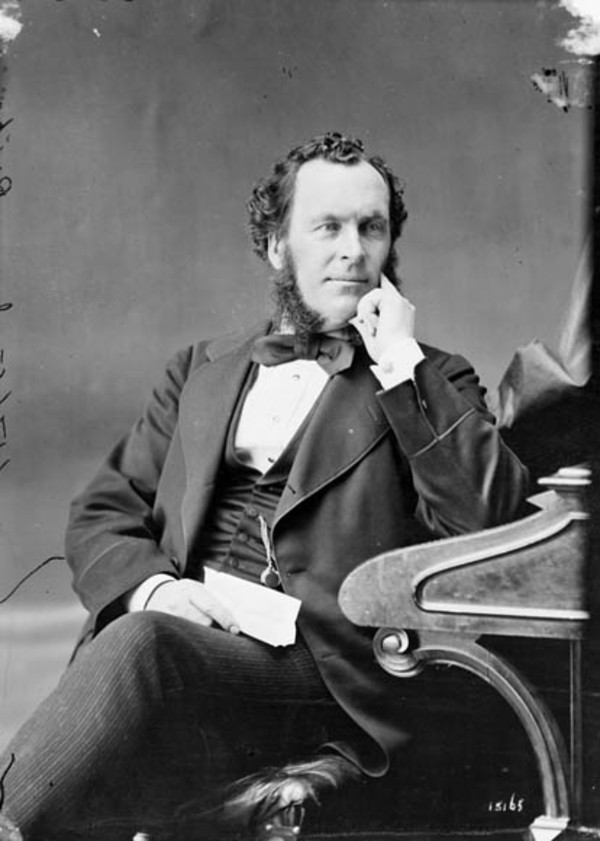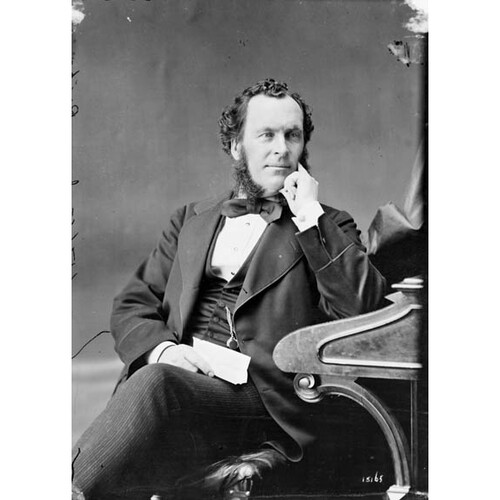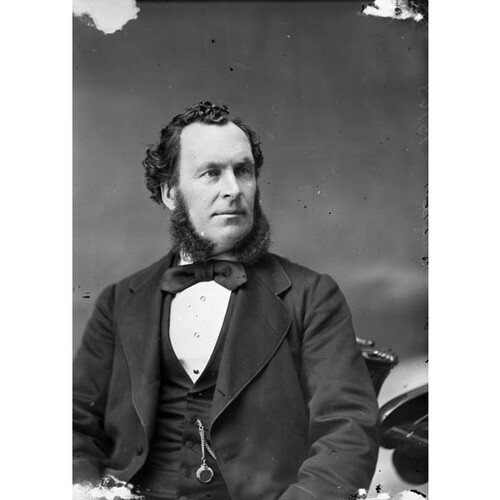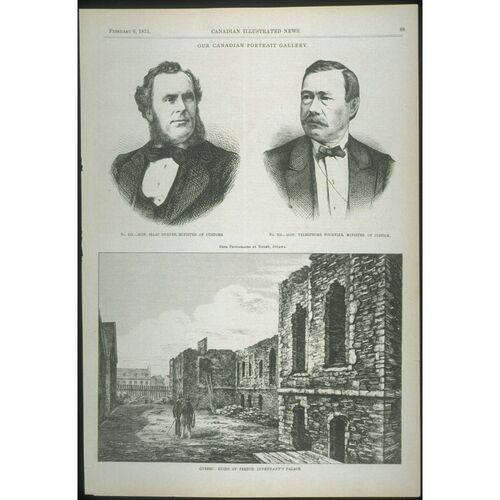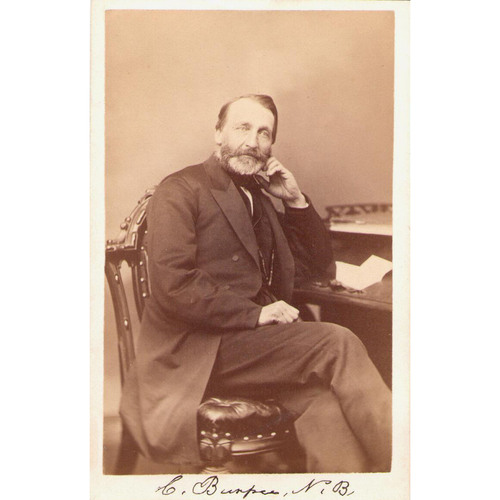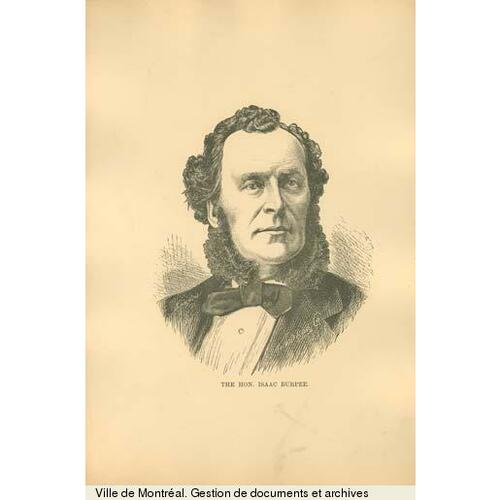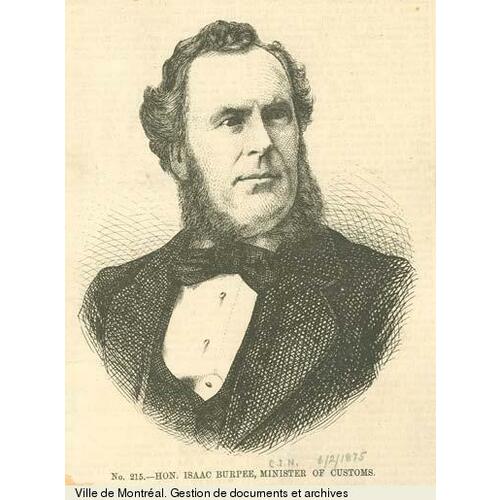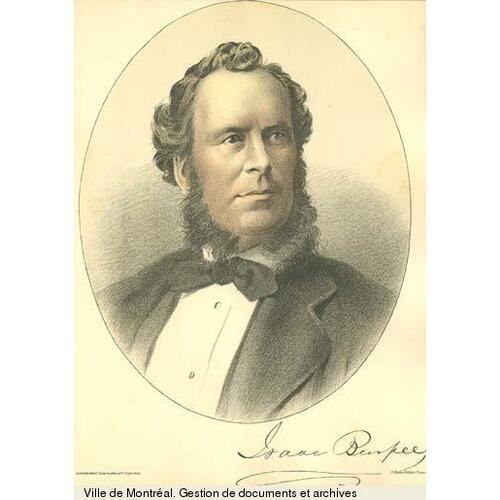BURPEE, ISAAC, merchant, entrepreneur, and politician; b. 28 Nov. 1825 at Sheffield, Sunbury County, N.B., eldest child of Isaac Burpee and Phoebe Coban; m. in 1855 Henrietta Robertson, and they had eight children; d. 1 March 1885 in New York City.
Isaac Burpee, the descendant of pre-loyalist settlers from Massachusetts, was educated at the Sheffield Grammar School and in 1848 moved to Saint John, N.B. There, with his brother Frederick, he established a flourishing hardware business which by 1872 had become a “wholesale only” establishment selling not only small wares but also significant quantities of imported and domestic iron and steel. In the 1860s he purchased valuable property in Saint John and a home in the suburb of Portland (now part of Saint John), and by 1872 the assessed value of his personal and real estate in the city was $70,000.
As Burpee’s fortune grew, he began investing in a variety of industrial enterprises based on his hardware company in Saint John. In partnership with Howard Douglas Troop* [see Jacob Valentine Troop], he established in 1882 a steamship line between London, Halifax, and Saint John, but the endeavour failed when the sole boat operated by the partners was wrecked on its second voyage. In 1883 Burpee and some associates purchased the Coldbrook Rolling Mills north of Saint John to produce iron and steel forms, nails, and spikes. His other interests were in the Confederation Life Association, the New Brunswick Land and Lumber Company, the Red Granite Company, which held property in Saint John and Charlotte counties, the Victoria Coal Mining Company, and the Saint John Cotton Company. Beginning in the early 1870s Burpee was heavily involved in the financing, construction, and operation of railways in the province. The Central Railway Company, with which his brother, Egerton Ryerson Burpee, and his uncle, Charles Burpee, were also involved, was to link Fredericton with Saint John, but construction was not begun until 1887. The New Brunswick Railway Company was to link Fredericton with Edmundston, via Woodstock, and opened for service in 1878. Burpee felt that not only would his hardware company and rolling-mills supply materials for the railways’ construction, but that the lines would run through lumber and coal-bearing lands he owned throughout the province. However, Burpee’s attempt to create an extended economic empire was not particularly successful; by 1884 he had made valuable investments but was struggling to show an operating profit on his holdings. Perhaps the demands of his wide-ranging business activities, coupled with an active career in federal politics, were too great for his energies and financial resources.
Burpee had first entered political life when he led the movement to incorporate Portland and became the first chairman of the town council in 1871. The following year he was elected member of parliament for the City and County of Saint John with an overwhelming majority. Originally an independent who supported Sir John A. Macdonald*’s government, Burpee became convinced over the summer and fall of 1873 of the government’s culpability in the Pacific Scandal and on 31 October joined the ranks of the Liberal opposition. A week later he was sworn in as minister of customs in Alexander Mackenzie*’s cabinet, after Protestant members of parliament for New Brunswick, including three of Burpee’s relatives, had pressured Mackenzie into appointing him rather than the Irish Catholic, Timothy Warren Anglin*. As customs minister until 1878, Burpee appears to have been efficient, knowledgeable, and conscientious. Although he was easily re-elected in Saint John in 1874, 1878, and 1882, he was not a notably skilful politician; Mackenzie thought him “a model office man but not good for six sentences in the House and no parliamentary knowledge.”
Burpee looked upon public service as an obligation to be fulfilled and concerned himself in politics mainly with business matters. His economic philosophy was typical of the 19th century laissez-faire school. He believed that individual enterprise and energy, not government legislation and protection, were the keys to personal and national progress. Like his colleagues in the Reform party in the 1870s, he accepted that depressions were natural, if unfortunate, and that the government’s role was to pare expenditures, keep down the public debt, and maintain tariffs at the lowest possible levels. Burpee apparently had no doubts, therefore, about opposing the protectionist National Policy of the Macdonald Conservatives during and after the 1878 federal election. He argued that the protective tariff was unfair to consumers, especially the poor and labourers, that it aided the interests of Ontario and Quebec at the expense of the Maritime provinces, that it was antithetical to the British connection, and that it would promote urbanization at the expense of rural, agricultural interests. Perhaps most important, he felt the high tariff favoured not the majority of manufacturers but only a specific few such as sugar refiners and cotton and woollen manufacturers. Burpee’s efforts to promote industrial activity in New Brunswick in the 1880s may well have been, therefore, a defensive and unwilling response to the protective tariff, and his lack of any great success in his own endeavours probably confirmed his negative opinion of the National Policy.
Although his being an important businessman undoubtedly aided Burpee’s political career, it also presented problems. In November 1873 a cry was raised about the propriety of selecting a large importer as minister of customs, and as a result Burpee retired, at least pro forma, from his hardware firm. This was but one of several conflict of interest accusations levelled at him while he was minister. Even after the defeat of the Liberals in 1878, Burpee was accused by newspapers opposed to him in the 1882 election of attempting to manipulate import duties imposed by Washington on incoming lumber in such a way as to injure the sawmilling industry of Saint John and increase traffic on the New Brunswick Railway, of which he was vice-president. The significance of business affairs in Burpee’s political career can also be seen in the fact that James Domville*, Conservative mp for Kings County from 1872 to 1882, was Burpee’s most consistent political antagonist as well as a business competitor.
Besides his activities in business and politics, Burpee gave of his time and money to a number of charitable or social agencies, including the New Brunswick Deaf and Dumb Institute, the Saint John Industrial School, the Portland Free Public Library, the Saint Paul’s Sunday School House, and the Marysville Methodist Church. He showed an interest in such community endeavours as the Saint John centennial celebrations in 1883 and the New Brunswick Historical Society, founded in 1874. He also held executive positions on the Congregational Union of New Brunswick and Nova Scotia and the Evangelical Alliance of New Brunswick during the 1870s.
The last two years of Burpee’s life were unhappy. Aside from business problems, his second son was drowned in July 1883 and his younger brother was killed in a train accident the following year. These tragedies gave Burpee a feeling of impending doom. “The sad bereavements we have passed through,” he wrote Edward Blake*, “has made me feel as if something harder would soon come again. I have been tending more to my private affairs in consequence, and almost feel afraid to leave my family.” His sense of foreboding proved correct for, after putting his affairs in order, he died of either liver or heart disease in New York City in March 1885.
Though not a politician of major significance, Burpee was a notable example of the involved 19th-century Canadian entrepreneur. As a hard-working, efficient, and upstanding businessman, he had managed to accumulate an estate valued at his death at approximately $200,000.
[There is no manuscript collection of Isaac Burpee papers, but useful information may be gleaned from N.B. Museum, Isaac Burpee, estate papers, 1887–1907; Scrapbooks C9, C58; and the Reverend Robert Wilson’s scrapbook. See also PAC, MG 23, D1; MG 26, B; E; and PANB, York-Sunbury Hist. Soc. coll., Burpee family papers. AO, MU 136–273, contains letters from Burpee, and the records of the Registrar of Deeds (Saint John, N.B.) provide evidence of Burpee’s land transactions. Useful unpublished materials include PANB, I. M. McQuinn, “Histories and origins of the railways of New Brunswick” (typescript), and “N.B. political biog.” (J. C. and H. B. Graves), I: 59. w.m.b.].
Can., House of Commons, Debates, 1875–85. N.B., Acts, 1864–89. Daily Sun (Saint John, N.B.), 1882, March 1885. Daily Telegraph (Saint John, N.B.), 11 July 1883. Globe, 1873, 1875, 29 Sept. 1876, 1883. New Dominion and True Humorist (Saint John, N.B.), 1872–74. Ottawa Daily Citizen, 1873–74. Ottawa Times, 1873–74. Saint John Globe, 1867–73, 14 Dec. 1901. Canadian directory of parl. (J. K. Johnson). CPC, 1873; 1879. Dent, Canadian portrait gallery, IV: 25–26. Encyclopedia Canadiana, II: 143. Wallace, Macmillan dict. Michael Bliss, A living profit: studies in the social history of Canadian business, 1883–1911 (Toronto, 1974). K. J. Donovan, “New Brunswick and the federal election of 1878” (ma thesis, Univ. of New Brunswick, Fredericton, 1973). Thomson, Alexander Mackenzie. Waite, Canada, 1874–96. T. W. Acheson, “The national policy and the industrialization of the Maritimes, 1880–1910,” Acadiensis, 1 (1971–72), no.2: 3–28. C. M. Wallace, “Saint John, New Brunswick (1800–1900),” Urban Hist. Rev. (Ottawa), [4] (1975–76), no.1: 12–21.
Cite This Article
William M. Baker, “BURPEE, ISAAC,” in Dictionary of Canadian Biography, vol. 11, University of Toronto/Université Laval, 2003–, accessed January 8, 2025, https://www.biographi.ca/en/bio/burpee_isaac_11E.html.
The citation above shows the format for footnotes and endnotes according to the Chicago manual of style (16th edition). Information to be used in other citation formats:
| Permalink: | https://www.biographi.ca/en/bio/burpee_isaac_11E.html |
| Author of Article: | William M. Baker |
| Title of Article: | BURPEE, ISAAC |
| Publication Name: | Dictionary of Canadian Biography, vol. 11 |
| Publisher: | University of Toronto/Université Laval |
| Year of revision: | 1982 |
| Access Date: | January 8, 2025 |


